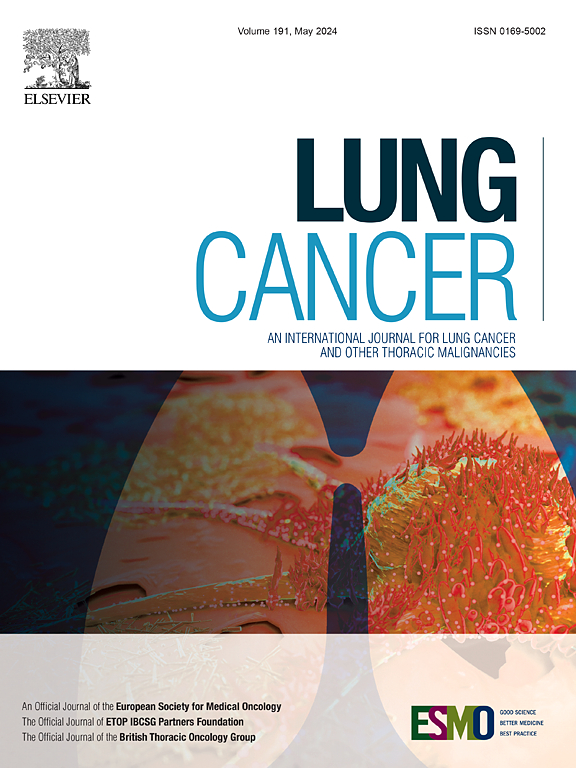Investigation of cardiotoxicity in patients treated with osimertinib: findings from the OSI-FACT study
IF 4.5
2区 医学
Q1 ONCOLOGY
引用次数: 0
Abstract
Introduction
Osimertinib is a highly effective first-line treatment for advanced epithelial growth factor receptor (EGFR) mutation-positive non-small cell lung cancer (NSCLC). With its expanded perioperative use, the long-term risk of cardiotoxicity merits investigation. We assessed the occurrence and risk factors of QT prolongation and cardiac dysfunction in patients with NSCLC treated with first-line osimertinib across multiple institutions.
Methods
This retrospective cohort study, a part of the OSI-FACT study, included 538 patients who started first-line osimertinib treatment between August 2018 and December 2019. Patients receiving concurrent anticancer therapies were excluded. Clinical data, including patient characteristics, EGFR mutation status, and tumor stage, were analyzed. Cardiotoxicity graded per Common Terminology Criteria for Adverse Events version 5.0 was monitored via ECG and echocardiography over a median follow-up of 37 months.
Results
QT prolongation occurred in 23 patients (4.3 %), with eight reaching Grade ≥3. The median time to onset was 246 days. No significant risk factors for QT prolongation were identified. Cardiac dysfunction was reported in 14 patients (2.6 %), with five cases of Grade ≥3. The median onset was 171 days, with cases occurring after six months. Multivariate analysis identified poor performance status as a risk factor for cardiac dysfunction (HR 2.24, p = 0.005).
Conclusion
Osimertinib-related cardiotoxicity, while rare, has important clinical implications, particularly for older patients and those with comorbidities. Regular monitoring, beyond the first year, is essential to ensure patient safety.
奥西替尼治疗患者心脏毒性的调查:来自OSI-FACT研究的结果
奥西替尼是晚期上皮生长因子受体(EGFR)突变阳性的非小细胞肺癌(NSCLC)的高效一线治疗药物。随着围手术期应用的扩大,心脏毒性的长期风险值得研究。我们评估了多个机构接受一线奥西替尼治疗的非小细胞肺癌患者QT间期延长和心功能障碍的发生和危险因素。该回顾性队列研究是OSI-FACT研究的一部分,纳入了2018年8月至2019年12月期间开始一线奥西替尼治疗的538例患者。同时接受抗癌治疗的患者被排除在外。分析临床资料,包括患者特征、EGFR突变状态和肿瘤分期。在中位随访37个月期间,通过心电图和超声心动图监测根据不良事件通用术语标准5.0分级的心脏毒性。结果qt延长23例(4.3%),其中8例达到≥3级。中位发病时间为246天。未发现明显的QT延长危险因素。心功能障碍14例(2.6%),其中5例≥3级。中位发病时间为171天,有病例发生在6个月后。多因素分析发现,表现不佳是心功能障碍的危险因素(HR 2.24, p = 0.005)。结论:奥西替尼相关的心脏毒性虽然罕见,但具有重要的临床意义,特别是对老年患者和有合并症的患者。第一年以后的定期监测对于确保患者安全至关重要。
本文章由计算机程序翻译,如有差异,请以英文原文为准。
求助全文
约1分钟内获得全文
求助全文
来源期刊

Lung Cancer
医学-呼吸系统
CiteScore
9.40
自引率
3.80%
发文量
407
审稿时长
25 days
期刊介绍:
Lung Cancer is an international publication covering the clinical, translational and basic science of malignancies of the lung and chest region.Original research articles, early reports, review articles, editorials and correspondence covering the prevention, epidemiology and etiology, basic biology, pathology, clinical assessment, surgery, chemotherapy, radiotherapy, combined treatment modalities, other treatment modalities and outcomes of lung cancer are welcome.
 求助内容:
求助内容: 应助结果提醒方式:
应助结果提醒方式:


